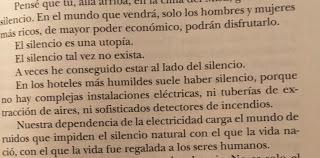
Sigo dándole vueltas al regusto que me ha quedado en el paladar después de leer la novela Alegría de Manuel Vilas. Como conflicto de intereses he de decir que es uno de mis autores favoritos y que su forma de narrar es una de las más originales del panorama literario contemporáneo. No tengo ninguna duda de que esta obra será otro éxito internacional como la anterior, y lo hará por méritos propios, además de buena literatura su narrativa es sanadora. Y lo es por varios motivos. El primero por ser un testimonio autobiográfico de que la vida es dura, en ocasiones terrible, y aun así tenemos la capacidad de seguir adelante. El síndrome de una vida de mierda existe, y cuando nos alcanza nos sumerge en el infierno más profundo. Y ese momento nos llega a todos los mortales, las crisis vitales son inherentes a la vida. El sufrimiento puede surgir por múltiples frentes entre los que el autor elige dos: sus padres muertos y sus hijos vivos. Desde esta doble perspectiva de relaciones verticales y biológicas nos ofrece su experiencia de muerte y resurrección dado que los muertos que una vez amamos no desaparecen nunca y los vivos que amamos y se alejan tampoco. La novela toca tangencialmente las relaciones horizontales de amistad y pareja sin perder el foco en lo anterior que es lo que el autor nos quiere contar. Al final todo es una búsqueda de sentido y es por eso por lo que esta obra produce esperanza en quien la lee. Es posible convivir con los propios fantasmas y seguir buscando la alegría.
Otro mérito de la novela es la forma de expresar la relación del autor con su sufrimiento al que decide llamar Arnold. Vilas camina por su mundo interno poniendo un nombre nuevo a todos aquellos que son importantes para él y su fantasma personal no podía faltar. Esto me parece clarividente en un mundo que nos invita a encerrar en profundas mazmorras todo lo que nos disgusta. Los demonios personales solo se pueden vencer cuando tenemos el valor de sacarlos a la luz como nos llevan diciendo los psicólogos desde tiempos pretéritos. Convertir el sufrimiento personal en narrativa sigue siendo una de las medicinas más potentes que conozco y este libro es un ejemplo. Incluso cuando no tenemos nadie que nos escuche es posible plasmar en un papel aquello que nos aterra o atormenta. Y aunque no tengamos el talento del autor, ese paso de valor nos ayudará a que en la sombra amenazante de nuestra crisis vital brille la frágil cerilla de quien pone en palabras su oscuridad.
La narrativa es una manera maravillosa de recrear mundos y permitirnos escuchar y aprender de distintos autores. Cumple una función de entretenimiento y en ocasiones de inspiración, enseñanza y regocijo. Esta obra ayuda a mirar sin miedo las relaciones paternofiliales, a recordar lo importantes que son, a animarnos a cuidarlas. En un mundo convulso y despistado es bueno que alguien nos invite a rescatar lo importante y a poner la vista en algo tan bello como la alegría.

The literature of Manuel Vilas as medicine
I keep thinking about my aftertaste after reading the novel Alegría by Manuel Vilas. As a conflict of interests I have to say that he is one of my favourite authors and that his writting is one of the most original on the contemporary literary scene. I have no doubt that this work will be another international success like the previous one, and will do so on its own merits, as well as good literature its narrative is healing. And it is for several reasons. The first is because it is an autobiographical testimony that life is hard, sometimes terrible, and yet we have the ability to move forward. The syndrome of a shitty life exists, and when it reaches us it plunges us into the deepest hell. And that moment comes to all mortals, life crises are inherent to life. Suffering can arise on multiple fronts from which the author chooses two: his dead parents and his living sons. From this double perspective of vertical and biological relations, he offers us his experience of death and resurrection, given that the dead that we once loved never disappear and the living that we love and move away either. The novel touches tangentially the horizontal relations of friendship and couple without losing the focus on what the author wants to tell us. In the end everything is a search for meaning and that is why this work produces hope in those who read it. It is possible to live with one's own ghosts and to continue searching for joy.
Another merit of the novel is the way of expressing the author's relationship with his suffering which he decides to call Arnold. Vilas walks through his inner world giving a new name to all those who are important to him and his personal ghost could not be missing. This seems to me clairvoyant in a world that invites us to shut up in deep dungeons everything that we dislike. Personal demons can only be defeated when we have the courage to bring them to light, as psychologists have been telling us since ancient times. Turning personal suffering into narrative continues to be one of the most potent medicines I know and this book is an example. Even when we have no one to listen to us, it is possible to put on paper what terrifies or torments us. And even if we don't have the author's talent, this step of courage will help us to shine in the threatening shadow of our vital crisis the fragile match of the one who puts his darkness into words.
Narrative is a wonderful way of recreating worlds and allowing us to listen to and learn from different authors. It fulfils a function of entertainment and at times of inspiration, teaching and rejoicing. This work helps us to look fearlessly at paternal-child relationships, to remember how important they are, to encourage us to take care of them. In a convulsed and absent-minded world, it is good that someone invites us to rescue what is important and to set our sights on something as beautiful as joy.

曼努埃爾·維拉斯(Manuel Vilas)的醫學著作。
讀完曼努埃爾·維拉斯(Manuel Vilas)的小說《阿萊格里亞》(Alegría)之後,我一直在思考自己的回味。作為利益衝突,我不得不說他是我最喜歡的作家之一,他的著作是當代文學界最新穎的著作之一。我毫不懷疑,這項工作將像上一屆一樣是另一項國際性的成功,並且將憑藉其自身的優點以及其敘述正在癒合的優秀文獻而取得成功。這是出於幾個原因。首先,因為生活是艱難的,有時甚至是可怕的,這是自傳的證詞,但是我們有前進的能力。卑鄙的生活的綜合症存在,當它到達我們時,它使我們陷入最深的地獄。那一刻到所有凡人,生命危機是生命固有的。苦難可能出現在多方面,提交人從中選擇了兩個:死去的父母和生下的兒子。從這種縱向和生物學關係的雙重視角,他給我們提供了死亡和復活的經歷,因為我們曾經愛過的死者永遠不會消失,而我們曾經愛過和搬走的生活也不會消失。這部小說切切地觸及了友誼和夫妻之間的橫向關係,而又沒有失去對作者想告訴我們的內容的關注。最後,一切都是對意義的追求,這就是為什麼這項工作在閱讀它的人中產生希望的原因。可以與自己的幽靈一起生活,並繼續尋找喜悅。
小說的另一個優點是表達作者與苦難之間關係的方式,他決定稱其為阿諾德。維拉斯(Vilas)走遍了他的內心世界,為所有對他重要的人起了個新名字,他的個人幽靈不會丟失。在我看來,這是一個千篇一律的世界,它邀請我們將我們不喜歡的一切封閉在深層的地牢中。正如我們自古以來心理學家告訴我們的那樣,只有當我們有勇氣揭露它們時,才能擊敗個人惡魔。將個人的痛苦變成敘事仍然是我所知道的最有效的藥物之一,而這本書就是一個例子。即使當我們沒有人聽我們講話時,也有可能將使我們恐懼或折磨的東西寫在紙上。即使我們沒有作者的才華,這一勇氣的步驟也將幫助我們在重大危機的威脅陰影中閃耀,這是將黑暗表達出來的人的脆弱匹配。
敘事是重塑世界並允許我們聆聽不同作者並向其學習的一種絕妙方式。它具有娛樂功能,並在啟發,教學和歡樂時發揮作用。這項工作有助於我們無畏地看待親子關係,記住它們之間的重要性,並鼓勵我們照顧它們。在一個動盪不安,心不在b的世界中,有人邀請我們拯救重要的事物並將目光投向美麗如喜悅的事物是一件好事。
自動翻譯,為錯誤而感到抱歉。

